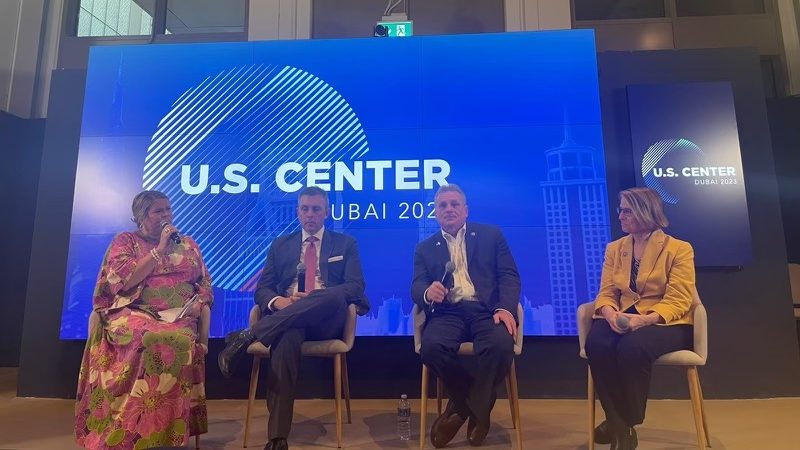
Elephants in the Room
December 12, 2023
By Bryant Wolff, J.D. Candidate 2024, University of Maine School of Law
Much like our planet, COP28 is heating up; while Loss and Damage has come to a close, the Global Stocktake, Global Goal on Adaptation, climate finance, and much more are still in the midst of negotiations. Questions around including language like “phase out” or “phase down,” “abated” or “unabated,” “common but differentiated responsibilities” still remain. Most of us still here at COP28 are running on fumes but Parties will need to push through, have another cup of coffee, and accomplish meaningful progress on negotiations. However, not all here share the view that language around phasing out, or even phasing down, fossil fuels is a priority at COP28.
Those at the U.S. Center at COP28 were joined by a panel of Republican House Representatives which included Rep. Kelly Armstrong (N.D.), Rep. Earl Carter (GA), and Rep. Marienette Miller-Meeks (IA) to discuss conservative perspectives on reducing emissions within the United States. Statements focused less on what still needs to be done to develop the clean energy economy of the United States, and more on patting ourselves on the back for what has been done so far. Even though fossil fuel companies have continued to reap more and more profits each year, the Republican Representatives showed support regardless, citing marginal emission reductions. Representative Carter touted that fossil fuel companies haven’t done a good enough job telling people what a good job they’ve been doing lowering their emissions; a stark contrast from the thousands here at COP28 calling out fossil fuel companies and seeking a clean energy future.
Representative Carter of Georgia stated, “it’s about emissions not the source,” but in the face of the world’s greatest challenge, the panel’s clear support for fracking, nuclear energy, carbon capture sequestration (CCS), and “future technologies” shows that they would rather address the effects than root of the problem. Justifications for the continued use of fossil fuels were security, affordability, and reliability, typical arguments for those unwilling to stand with the world in the fight against climate change. The conservative panel pointed fingers and emphasized that the rest of the world needs to step up and that climate change is a global problem, not a United States’ problem, but this ignores the reality of historical emissions and common but differentiated responsibilities in addressing our climate crisis.
Statements in support of producing the cleanest fossil fuel in the world felt contrarian to the purpose of COP28 amongst the University of Maine Delegation. At the world’s largest climate change conference, States, policy makers, advocates, and scientists have spoken louder than ever in support of an end to the addiction to fossil fuels. While the extent of meaningful action to addressing climate change at COP28 is unclear, with so many focused on the future, the words of House Republicans feel as much a fossil as the fossil fuels we seek to phase out.

